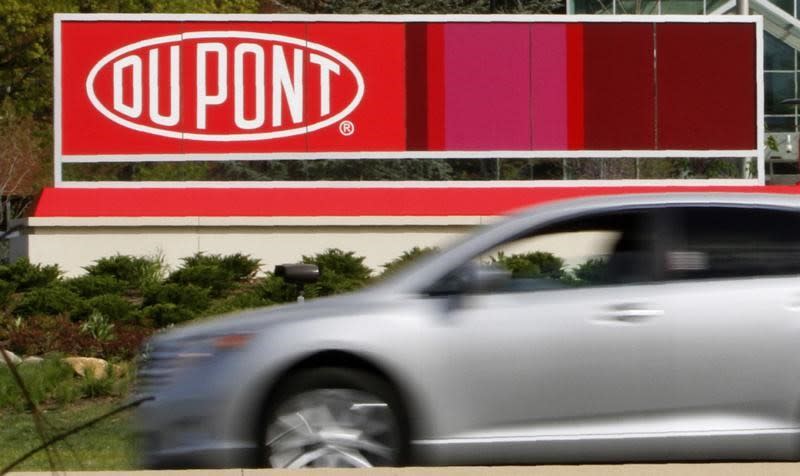DuPont wins board proxy fight against activist investor Peltz

By Tom Hals
WILMINGTON, Del. (Reuters) - DuPont (DD.N) repelled a board challenge from activist investor Nelson Peltz on Wednesday, dealing him a surprising blow after shareholders backed all 12 directors nominated by the U.S. chemical conglomerate's management.
Peltz's Trian Fund Management had sought four seats on the board, including one for himself, and had pushed the 213-year-old company to split its businesses to unlock more value for shareholders.
DuPont stock closed down 6.8 percent at $69.33, making it the top percentage loser in the Standard & Poor's 500 index (.SPX). This was the stock's biggest single-day decline since October 2012, and, with 33.5 million shares changing hands, this was the busiest trading day in the company's history.
The vote ends a high-stakes corporate drama that revved up in January when Trian announced its dissident slate. The hedge fund holds a 2.7 percent stake in DuPont, making it the company's fifth-largest shareholder.
DuPont won the backing of three of its largest shareholders, Vanguard Group, State Street Global and BlackRock Institutional Trust, which are index funds, according to a source close to the matter. Trian won the majority of non-index institutions and would have prevailed had one of those three index funds voted differently, the source said.
DuPont Chief Executive Officer Ellen Kullman said the company spent several months explaining to investors how it is retooling its business. A key focus has been the planned spinoff of its performance chemicals business, which supplies titanium dioxide products and Teflon coatings, in the coming weeks.
“We don’t tell our story well enough and have undergone a lot of change," Kullman told reporters at the annual meeting, which drew 400 shareholders in DuPont's hometown of Wilmington, Delaware.
DuPont, which said it spent $15 million on its shareholder campaign, also reached out to its retail investor base, which accounts for more than a third of shares.
"They normally don’t vote as often as they should, but apparently we got their attention this time, and they were active,” Kullman said.
Peltz acknowledged the need to spend more time with retail investors and index funds. But he said DuPont had already made important changes, including cost cuts and a share buyback, at Trian's prompting. "We don't believe these things would have occurred without our involvement," he said.
Before the meeting, it seemed as if Peltz would attain at least some success in the proxy fight. Trian's alternate slate had won at least partial public backing from proxy advisory firms such as ISS, as well as the California State Teachers' Retirement System, which owns 3.6 million DuPont shares.
DuPont's victory could be a model for how other chief executives could try to fend off activist investors, experts said.
SHADOW MANAGEMENT
DuPont, which had a market value of $68 billion as of Tuesday, had warned that Trian would try to establish a "shadow management" that would undermine the company's transformation.
Kullman, a 27-year DuPont veteran who has been CEO since January 2009, is also targeting another $1.3 billion in annual cost savings by the end of 2017. But growth challenges remain.
DuPont last month reported that first-quarter sales fell 9 percent, their biggest decline in five quarters.
Mawer Investment Management Ltd, which owns 900,000 DuPont shares, voted for the company's nominees partly because management seemed to be aware of a need for more cost cuts and improvements in operational efficiency, said portfolio manager Grayson Witcher.
Trian first approached DuPont nearly two years ago with ways it said the company could improve its operating performance, according to a filing.
Often, the $11 billion fund works behind the scenes during an activist campaign. Trian has won board seats at companies including Legg Mason Inc (LM.N) and more recently Bank of New York Mellon Corp (BK.N) in settlements rather than through proxy contests.
Trian had pushed DuPont for a more significant break-up: separating its agriculture, nutrition and health, and industrial biosciences units from those businesses with strong cash flows but that are more volatile. Trian had also said recently that it was not wedded to any specific strategy.
DuPont had offered Trian one seat on the board to resolve the proxy fight, but insisted that Peltz could not be the nominee.
Peltz said on Wednesday that he would monitor DuPont's performance and that the stock price could nearly double to $120 by the end of 2017.
Suntrust Robinson Humphrey analyst James Sheehan said he expected Trian to keep agitating for change.
"If DuPont’s financial performance stumbles," he said, "they can easily mount this proxy fight again and possibly prevail."
However, analysts speculated that Wednesday's drop in DuPont shares stemmed partly from anticipation that Peltz will soon unload his stake.
Evercore Partners Inc (EVR.N) and Goldman Sachs (GS.N) were DuPont's financial advisers. Skadden, Arps, Slate, Meagher & Flom LLP was the company's legal adviser.
(Additional reporting by Swetha Gopinath in Bengaluru, Svea Herbst-Bayliss in Boston, and David Gaffen and Nadia Damouni in New York; Writing by Lewis Krauskopf in New York; Editing by Michele Gershberg and Lisa Von Ahn)

 Yahoo Finance
Yahoo Finance 